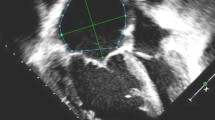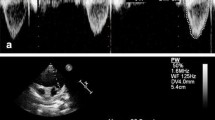Abstract
It is not always easy to observe and screen atrial septal defects (ASD) using echocardiography. In addition, there are no established echocardiographic reference indices for screening patients with ASDs. We retrospectively reviewed our database and recruited 151 isolated ASD patients and 2769 healthy subjects. In total, 307 echocardiographic studies were performed for ASD patients. Surgical repairs were done in 75 of the ASD patients. The ratio of right to left ventricular end-diastolic dimensions (RVD/LVD), which was determined by M-mode echocardiography, was used as an index of RV dilatation. After obtaining age- and body surface area (BSA)-related RVD/LVD nomograms in healthy subjects, we calculated the z-scores of RVD/LVD for all subjects and obtained the optimal cut-off values to differentiate patients with ASD from healthy subjects. The optimal cut-off values were high in neonates and gradually decreased with an increase in the age and BSA, but were almost constant in children aged >4 years or whose BSA was >0.65 m2. The cut-off values of RVD/LVD for suspected ASD were ≥0.42 in children aged >4 years or those whose BSA was >0.65 m2. Those for an ASD operation were ≥0.46 in those whose BSA > 0.65 m2. The RVD/LVD determined by M-mode echocardiography is a useful index to evaluate RV dilatation in patients with ASDs. The RVD/LVD ≥ 0.42 is the warning flag for suspecting ASD in preschool children and that ≥0.46 may be a clinical important sign to determine ASD operation.







Similar content being viewed by others
References
Aljizeeri A, Dennie CJ, Chan KL, Beauchesne LM (2014) Unroofed coronary sinus atrial septal defect: diagnosis by multimodality cardiac imaging. Echocardiography 31:E228–E229
Bayar N, Arslan S, Koklu E, Cagirci G, Cay S, Erkal Z, Ayoglu RU, Kucukseymen S (2015) The importance of electrocardiographic findings in the diagnosis of atrial septal defect. Kardiol Pol 73:331–336
Codreanu I, Pegg TJ, Selvanayagam JB, Robson MD, Rider OJ, Dasanu CA, Jung BA, Taggart DP, Clarke K, Holloway CJ (2011) Details of left ventricular remodeling and the mechanism of paradoxical ventricular septal motion after coronary artery bypass graft surgery. J Invasive Cardiol 23:276–282
de Simone G, Galderisi M (2014) Allometric normalization of cardiac measures: producing better, but imperfect, accuracy. J Am Soc Echocardiogr 27:1275–1278
Faletra F, Scarpini S, Moreo A, Ciliberto GR, Austoni P, Donatelli F, Gordini V (1991) Color Doppler echocardiographic assessment of atrial septal defect size: correlation with surgical measurements. J Am Soc Echocardiogr 4:429–434
Ganigara M, Tanous D, Celermajer D, Puranik R (2014) The role of cardiac MRI in the diagnosis and management of sinus venosus atrial septal defect. Ann Pediatr Cardiol 7:160–162
Gunday M, Alpaslan M, Ciftci O, Ozulku M, Copur G, Aslamaci S (2014) Is off-pump coronary artery bypass surgery superior to on-pump coronary artery bypass surgery on postoperative paradoxical ventricular septal motion? Heart Surg Forum 17:E191–E195
Hashimoto I, Watanabe K (2014) Alternation of right ventricular contraction pattern in healthy children. Circ J 78:1967–1973
Hashimoto I, Watanabe K (2014) Radial and longitudinal right ventricular function in children—reply. Circ J 78:2333
Jain A, Mohamed A, El-Khuffash A, Connelly KA, Dallaire F, Jankov RP, McNamara PJ, Mertens L (2014) A comprehensive echocardiographic protocol for assessing neonatal right ventricular dimensions and function in the transitional period: normative data and z scores. J Am Soc Echocardiogr 27:1293–1304
Jone PN, Hinzman J, Wagner BD, Ivy DD, Younoszai A (2014) Right ventricular to left ventricular diameter ratio at end-systole in evaluating outcomes in children with pulmonary hypertension. J Am Soc Echocardiogr 27:172–178
Kampmann C, Wiethoff CM, Wenzel A, Stolz G, Betancor M, Wippermann CF, Huth RG, Habermehl P, Knuf M, Emschermann T, Stopfkuchen H (2000) Normal values of M mode echocardiographic measurements of more than 2000 healthy infants and children in central Europe. Heart 83:667–672
Kardesoglu E, Cebeci BS, Celik T, Cingozbay BY, Dincturk M, Demiralp E (2004) Assessment of interventricular septal motion using colour tissue Doppler imaging in adult patients with atrial septal defect. J Int Med Res 32:14–18
Kelly NF, Walters DL, Hourigan LA, Burstow DJ, Scalia GM (2010) The relative atrial index (RAI)–a novel, simple, reliable, and robust transthoracic echocardiographic indicator of atrial defects. J Am Soc Echocardiogr 23:275–281
Kind T, Mauritz GJ, Marcus JT, van de Veerdonk M, Westerhof N, Vonk-Noordegraaf A (2010) Right ventricular ejection fraction is better reflected by transverse rather than longitudinal wall motion in pulmonary hypertension. J Cardiovasc Magn Resonance 12:1–35
Kjaergaard J, Petersen C, Kjaer A, Schaadt B, Oh J, Hassager C (2006) Evaluation of right ventricular volume and function by 2D and 3D echocardiography compared to MRI. Eur J Echocardiogr 7:430–438
Lopez L, Colan SD, Frommelt PC, Ensing GJ, Kendall K, Younoszai AK, Lai WW, Geva T (2010) Recommendations for quantification methods during the performance of a pediatric echocardiogram: a report from the pediatric measurements writing group of the American society of echocardiography pediatric and congenital heart disease council. J Am Soc Echocardiogr 23:465–495
Muta H, Akagi T, Egami K, Furui J, Sugahara Y, Ishii M, Matsuishi T (2003) Incidence and clinical features of asymptomatic atrial septal defect in school children diagnosed by heart disease screening. Circ J 67:112–115
Oki T, Iuchi A, Fukuda N, Tabata T, Hayashi M, Tanimoto M, Manabe K, Kageji Y, Sasaki M, Hama M et al (1994) Assessment of right-to-left shunt flow in atrial septal defect by transesophageal color and pulsed Doppler echocardiography. J Am Soc Echocardiogr 7:506–515
Oxborough D, Ghani S, Harkness A, Lloyd G, Moody W, Ring L, Sandoval J, Senior R, Sheikh N, Stout M, Utomi V, Willis J, Zaidi A, Steeds R (2014) Impact of methodology and the use of allometric scaling on the echocardiographic assessment of the aortic root and arch: a study by the research and audit sub-committee of the British society of echocardiography. Echo Res Pract 1:1–9
Pollick C, Sullivan H, Cujec B, Wilansky S (1988) Doppler color-flow imaging assessment of shunt size in atrial septal defect. Circulation 78:522–528
Reynolds HR, Tunick PA, Grossi EA, Dilmanian H, Colvin SB, Kronzon I (2007) Paradoxical septal motion after cardiac surgery: a review of 3,292 cases. Clin Cardiol 30:621–623
Rucker G, Schumacher M (2010) Summary ROC curve based on a weighted Youden index for selecting an optimal cutpoint in meta-analysis of diagnostic accuracy. Stat Med 29:3069–3078
Spiewak M, Malek LA, Petryka J, Mazurkiewicz L, Werys K, Biernacka EK, Kowalski M, Hoffman P, Demkow M, Misko J, Ruzyllo W (2012) Repaired tetralogy of fallot: ratio of right ventricular volume to left ventricular volume as a marker of right ventricular dilatation. Radiology 265:78–86
Vincent RN, Saurette RH, Pelech AN, Collins GF (1988) Interventricular septal motion and left ventricular function in patients with atrial septal defect. Pediatr Cardiol 9:143–148
Wong M, Shah PM, Taylor RD (1981) Reproducibility of left ventricular internal dimensions with M mode echocardiography: effects of heart size, body position and transducer angulation. Am J Cardiol 47:1068–1074
Yang S, Yamauchi K, Nonokawa M, Ikeda M (2002) Use of an artificial neural network to differentiate between ECGs with IRBBB patterns of atrial septal defect and healthy subjects. Med Inform Internet Med 27:49–58
Yang T, Liang Y, Zhang Y, Gu Q, Chen G, Ni XH, Lv XZ, Liu ZH, Xiong CM, He JG (2013) Echocardiographic parameters in patients with pulmonary arterial hypertension: correlations with right ventricular ejection fraction derived from cardiac magnetic resonance and hemodynamics. PLoS One 8:e71276
Zhang Y, Song H, Qiao X, Xiao X, Liu J, Wang X (2015) Detection and diagnosis of iatrogenic inadvertent diversion of partial inferior vena cava into the left atrium by transesophageal echocardiography during large posteroinferior surgical atrial septal defect closure. J Anesth 29:442–445
Zong P, Zhang L, Shaban NM, Pena J, Jiang L, Taub CC (2014) Left heart chamber quantification in obese patients: how does larger body size affect echocardiographic measurements? J Am Soc Echocardiogr 27:1267–1274
Author information
Authors and Affiliations
Corresponding author
Ethics declarations
Conflict of interest
None.
Rights and permissions
About this article
Cite this article
Hashimoto, I., Watanabe, K. & Ichida, F. Right to Left Ventricular Diameter Ratio ≥0.42 is the Warning Flag for Suspecting Atrial Septal Defect in Preschool Children: Age- and Body Surface Area-Related Reference Values Determined by M-Mode Echocardiography. Pediatr Cardiol 37, 704–713 (2016). https://doi.org/10.1007/s00246-015-1334-y
Received:
Accepted:
Published:
Issue Date:
DOI: https://doi.org/10.1007/s00246-015-1334-y




